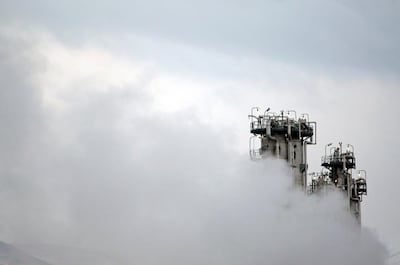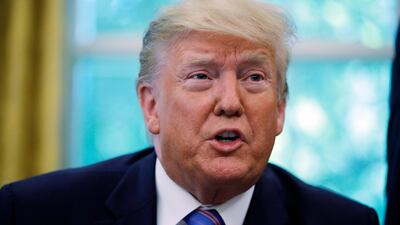US President Donald Trump warned Monday that Iran is "playing with fire" after Tehran said it exceeded a limit on enriched uranium reserves under a 2015 nuclear deal abandoned by Washington.
Israel urged European states to sanction Iran, while Russia voiced regret but said the move was a consequence of US pressure, which has pushed the deal towards collapse.
Britain called on Tehran "to avoid any further steps away" from the landmark deal, and the UN said Iran must stick to its commitments under the accord.
"Iran has crossed the 300-kilogramme limit based on its plan" announced in May, Foreign Minister Mohammad Javad Zarif told semi-official news agency ISNA.
But Mr Zarif also said the move could be reversed.
"They know what they're doing. They know what they're playing with and I think they're playing with fire," Mr Trump told reporters at the White House when asked about Iran.

The United States withdrew from the nuclear deal last year and hit Iran's crucial oil exports and financial transactions as well as other sectors with biting sanctions.
Tehran, which has sought to pressure the remaining parties to save the deal, announced on May 8 it would no longer respect the limit set on its enriched uranium and heavy water stockpiles.
It threatened to abandon further nuclear commitments unless the remaining partners — Britain, China, France, Germany and Russia — helped it circumvent sanctions, especially to sell its oil.
The White House had earlier said that "the United States and its allies will never allow Iran to develop nuclear weapons," vowing to continue exerting "maximum pressure" on the regime.
"It was a mistake under the Iran nuclear deal to allow Iran to enrich uranium at any level," spokeswoman Stephanie Grisham said in a statement.
"There is little doubt that even before the deal’s existence, Iran was violating its terms," the statement continued.
"Seriously?" Mr Zarif responded in a tweet.
Mr Zarif said Iran exceeding uranium reserve limits was not a violation of the accord, arguing that Tehran was exercising its right to respond to the US walkout.
The UN nuclear watchdog, the International Atomic Energy Agency (IAEA), which monitors Iran's nuclear programme under the deal, confirmed in Vienna that Tehran had breached the limit.
The White House charge that Iran probably was in violation of the nuclear deal before and after it was reached in 2015 sharply contrasts with CIA Director Gina Haspel’s testimony in January to the Senate Intelligence Committee saying, "At the moment, technically, they are in compliance."
Daryl Kimball, the executive director of the Arms Control Association, said the White House charge was "illogical".
He pointed out that at the time the nuclear deal was concluded, Tehran and the IAEA agreed on a "road map" through which Iran is addressing the nuclear watchdog’s unanswered questions about the nuclear weapons research programme that the IAEA and the US intelligence community assessed ended in 2003.
"The process is still under way," he said.
He also said there was no international standard prohibiting Iran from enriching uranium, as asserted by US Secretary of State Mike Pompeo. "That is not the case. That is an American position," he said.
The six UN Security Council resolutions that Mr Pompeo asserted established that standard were superseded by Resolution 2231 enshrining the nuclear deal and allowing Iran to enrich uranium within the agreement's restrictions.
____________
Beyond the headlines: Tanker attacks straight from Iran's playbook
____________
While Iran announced on Monday that it breached the deal's restriction on storing more than 300kg of low-enriched uranium, Mr Kimball said the issue would be adjudicated through the accord’s dispute resolution mechanism.
It was the United States, he said, that first violated the deal when Trump withdrew from it while Iran still was in compliance and then reimposed harsh US sanctions that had been suspended by the nuclear agreement.
Iran’s breach, he said, does not affect the deal’s central target of extending to a year the time in which Iran could "breakout" and produce enough highly enriched uranium for a warhead.
The breach is a political move aimed at pressuring the European Union, China and Russia to compensate Iran for the serious damage to its economy from US sanctions, he said.

